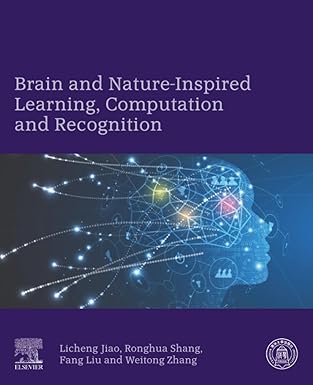
Brain and Nature-Inspired Learning, Computation and Recognition
Author(s): Licheng Jiao (Author), Ronghua Shang (Author), Fang Liu (Author), Weitong Zhang (Author)
- Publisher finelybook 出版社: Elsevier
- Publication Date 出版日期: February 4, 2020
- Edition 版本: 1st
- Language 语言: English
- Print length 页数: 788 pages
- ISBN-10: 0128197951
- ISBN-13: 9780128197950
Book Description
Brain and Nature-Inspired Learning, Computation and Recognition presents a systematic analysis of neural networks, natural computing, machine learning and compression, algorithms and applications inspired by the brain and biological mechanisms found in nature. Sections cover new developments and main applications, algorithms and simulations. Developments in brain and nature-inspired learning have promoted interest in image processing, clustering problems, change detection, control theory and other disciplines. The book discusses the main problems and applications pertaining to bio-inspired computation and recognition, introducing algorithm implementation, model simulation, and practical application of parameter setting.
Readers will find solutions to problems in computation and recognition, particularly neural networks, natural computing, machine learning and compressed sensing. This volume offers a comprehensive and well-structured introduction to brain and nature-inspired learning, computation, and recognition.
- Presents an invaluable systematic introduction to brain and nature-inspired learning, computation and recognition
- Describes the biological mechanisms, mathematical analyses and scientific principles behind brain and nature-inspired learning, calculation and recognition
- Systematically analyzes neural networks, natural computing, machine learning and compression, algorithms and applications inspired by the brain and biological mechanisms found in nature
- Discusses the theory and application of algorithms and neural networks, natural computing, machine learning and compression perception
Editorial Reviews
Review
Presents the latest on neural networks, natural computing, machine learning and compression, algorithms and applications inspired by the brain
About the Author
Ronghua Shang is Professor of the School of Artificial Intelligence at Xidian University. She has authored or co-authored 5 monographs and 80 papers.
Fang Liu is a Professor of the School of Artificial Intelligence at Xidian University. She has authored or co-authored over 10 monographs and over 80 papers.
Weitong Zhang is a PhD researcher in the School of Artificial Intelligence at Xidian University. Her research focuses on dynamic complex networks and she has published several papers in the field.
 finelybook
finelybook
